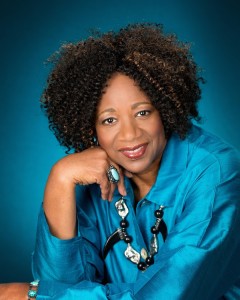Ari Interviews Betty Brown-Chappell
Dr. Betty Brown-Chappell is our special guest at this year’s 10th Annual African American Foodways Dinner at Zingerman’s Roadhouse on Wednesday, Janury 28 at 7pm. Don’t miss it!

Dr. Betty Brown-Chappell
One of the things I love about living in this community is that we have such a plethora of powerfully creative, inspiring, intelligent individuals who are so willing to share of themselves and their life’s learnings. Being around great people, people who are willing to follow their own path, to speak their minds in caring and constructive ways, to work hard to make a positive difference in the community and the world is, in itself, energizing. The difference that these special people have made and are making inspires me learn and contribute more every day!
Dr. Betty Brown-Chappell is one of those people. Her teaching, writing and community work are all inspirations for the rest
of us. She has worked hard making her own way in the world, fighting through racial barriers, glass ceilings and the disadvantages that come with growing up poor where access and resources are so often limited.
This year we’re excited to have Dr. Brown-Chappell as the speaker at our tenth annual African American foodways dinner at the Roadhouse. The event will celebrate Dr. Brown-Chappell’s recent release of her book, Open Secrets: A Poor Person’s Life in Higher Education. Chef Alex Young has crafted a menu that pays homage to her country roots—she grew up in a farm family near South Haven. “Strawberry Lessons and Blueberry Blessings” will pull from some of the food stories in Dr. Brown-Chappell’s book as we continue to pay homage to the great culinary contribution of the African American community in this U.S. The dinner will combine good food, good conversation and stories and insights from Dr. Brown-Chappell. We hope you can join us to pay homage to her work, and to the foodways of the African American farm community. Below is a bit of an interview I did with Dr. Brown-Chappell. Hopefully it leaves you hungry for more! Hope to see you at the Roadhouse on January 28th! – Ari
Ari: Can you tell us a bit about your new book, Open Secrets: A Poor Person’s Life in Higher Education?
Dr. Betty Brown-Chappell: It is a memoir of my experiences as an African American woman during some of America’s most tumultuous times – 1946 to present.
Because I want to be part of the solution to the problem of low graduation rates for those who, like me, may be the first in their family to attend or graduate from college and who may come from a low-income background I also provide some lessons I have learned in higher education. I have also tried to provide some of the hard-fought lessons I learned during my journey for folks in high school, college or graduate school; families, friends and counselors may also learn from these lessons.
You grew up in southwestern Michigan. What was that like?
The area was very rural – you might say “rough and tumble.” We did not have lights, indoor sanitation, or running water for much of my early childhood years; we lived on a dirt road. Also, the predominantly white population was at times violently racist. As a young child I was physically assaulted on the playground and taunted with racial epitaphs. There was even an instance where some neighbors set a fire in our backyard. Over many years our white neighbors and schoolmates stopped the violence.
Most Americans know little about the story of African American farmers in this country. It’s been a very difficult road – sadly there are so few African Americans still farming. Can you tell us more about that?
The African American families that I knew in the southwestern part of Michigan during my childhood generally farmed part-time. My father and his friends often worked in light industrial jobs that supported the automobile industry. Once they completed an eight-hour shift at the foundry, then they returned to their farms to work for several hours. Like most of the women in the area my mother was a housewife with a large broods of children, eight, to care for.
I learned in 2013 that my parents were part of the 70,000 farmers of color who were discriminated against by federal and local loan practices. Farm loans had been subsidized by the U.S. Department of Agriculture for many decades, but Black farmers were systematically excluded from the benefits of federal banking policy. In 2012 over a billion dollars was offered to repay these farmers, yet with our parents deceased no one in the family knew that we should apply for the reparations. Taken together with the trend to concentrate farming into large corporate entities, this historic discrimination in loan practices effectively prevented many African Americans from operating viable farms in today’s economy. This is a simplified version of the many obstacles African American farmers have experienced.
In your book you have chapters titled “Strawberry Lessons” and “Blueberry Blessings.” Tell us more.
Virtually no day goes by without news media that bemoan the loss of the middle-class. The African American families of my childhood who entered the middle class were able to do so not only because they worked day and night for what proved to be a living wage, but also because they were very frugal. They literally learned to spin straw into gold! These two chapters recount my family’s dependence on and gratitude for access to the lower-middle class due to the yield’s of these two crops. My experiences as a child farm worker led me to be an optimist: many things are possible with creativity and hard work. I also learned to enjoy and appreciate the nutrients provided by fresh foods. I can’t wait until it’s time to plant my backyard vegetable garden next spring!
Can you share a few of the lessons that you have learned?
Two lessons have been particularly important to both me and to my students at Eastern Michigan University: (1) To complete a degree you need support. Friends and family regardless of your financial situation will be important, but be grateful to whoever provides you with support. (2) Mentors can make or break the student who seeks a degree; students should seek them out, treat them with respect, and allow them to provide guidance.
What is the struggle of “twoness” that you mention?
This idea originally was used to describe the experience of Jewish citizens as they attempted to “melt” into the American culture. Black scholars built on the concept to mean “ . . . blacks operate with a “twoness” of behavior where one uses knowledge, manners, dress, and verbal cadences of the dominant culture to navigate in professional situations . . . while one alternatively speaks, acts, and dresses appropriate to the Black world where one most likely passes all non-professional time.”
Throughout your life – life most African Americans—you have experienced bias and prejudice. Can you reflect on that?
A student recently asked me which of the three types of discrimination that I have experienced, classism, racism, or sexism has presented the greatest obstacle for me. My answer was classism because I have done without the necessities of life – that is experienced poverty – as a child and young adult. To me poverty is largely intransient in America and is no longer an “in” topic for civic discussion. Yet child poverty among the innocents, young children, will dictate their life chances in many ways during adulthood. Classism also means that large swaths of our society who have means stick together, help each other out or trade favors. But the poor have a lot less to help each other with.
The menu this year will reflect a lot of the diet that you grew up with in South Haven, MI. What was the food like in your childhood?
We lived in an area with an abundance of wildlife such as pheasants and rabbits that my father shot and my mother served for dinner. Probably what offset our extreme poverty (besides the assistance of relatives) was that we generally had adequate nutrition such as fresh or canned fruits and vegetables from our farm. While our protein sources were also the pigs, cows, and chickens we raised we also ate a lot of navy beans. As migrants from Texas and Kentucky my parents brought many recipes from that region: sweet potato pie, candied yams, corn pudding, or fruit cobblers. My father was a cook in the Navy during WW II and he insisted that we have fish once a week. Seafood was a rare treat. Some of the foods they favored such as fried okra or rhubarb pie I have never been able to stomach…
See you at the Dinner!




Zingerman’s Art for Sale